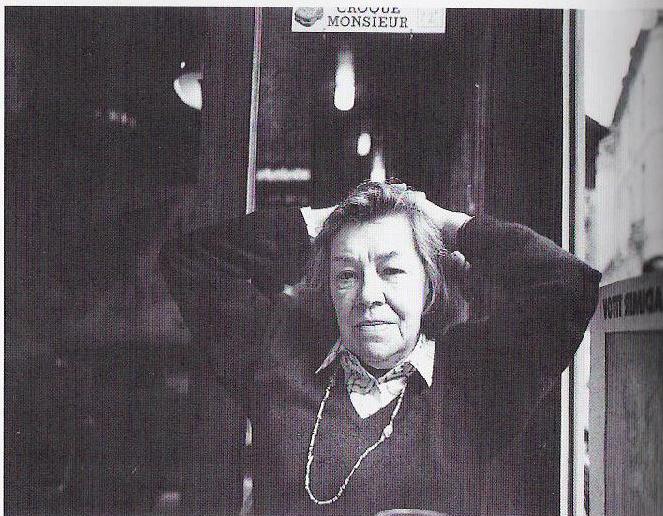The Talented Miss Highsmith
So, once or twice a year, I foster a mini-obsession with a female writer who is, usually, fabulous, talented, queerish, and dead (for those of you who would view this as sublimation or my way of feeling safe in a relationship, you're geniuses! Call me).
Last winter, it was Anais Nin (following a brief but doomed affair with Gertrude Stein). Last Summer, Iris Murdoch. Before that, it was Mary McCarthy. I could go on and on.
This summer, it's Patricia Highsmith. I am reading The Price of Salt, her "lesbians on the road/run" novel, and the controversial The Tremor of Forgery, which Graham Greene thought was her finest, and which is set in Tunisia.
I am almost finished reading her bio, Beautiful Shadow, which links the personal tragedies relating to her partners and mother and friends and cats with her perpetual movement from country to country and lover to lover and idea to idea and novel to novel. The bio includes sentences such as this one: "...she hated the expense of living in France. She felt particularly outraged that a bottle of Johnny Walker Scotch cost her 35 francs." It also elucidates how (stereotypically ) dyke-y Highsmith was, moving in with girlfriends within days of meeting them, and then complaining that she hadn't the space and time to write. One anecdote I love is about how during an interview at a friend's home, the phone ringing and noises outside annoyed her so much, or made her feel so out of control, she marched up to a huge curtain, ripped it off the wall, and demanded it be cleaned.
Here are two amazing B&W pictures of Highsmith. I love them because, while on the surface they appear so starkly different (topless vs. shirted and collared), they are actually very simple and similar in spirit and composition: in both, she has her arms raised, in both, she has a drawn mouth, in both, there is some dark space to her right, and our left, almost as though someone else should be standing or sitting there. That someone could have easily been her resentment; her anger; her ego, so gargantuan were these emotions in her they could have possessed bodies.
 Highsmith, 1942 (Rolf Tietgens/SLA)
Highsmith, 1942 (Rolf Tietgens/SLA)
 Highsmith, 198? (Bassouls/Sygma)
Highsmith, 198? (Bassouls/Sygma)
The similarity reminds me of Highsmith's ever-present fictional theme: at their very core, people just don't change.
Quite simply, she takes my breath away.
Last winter, it was Anais Nin (following a brief but doomed affair with Gertrude Stein). Last Summer, Iris Murdoch. Before that, it was Mary McCarthy. I could go on and on.
This summer, it's Patricia Highsmith. I am reading The Price of Salt, her "lesbians on the road/run" novel, and the controversial The Tremor of Forgery, which Graham Greene thought was her finest, and which is set in Tunisia.
I am almost finished reading her bio, Beautiful Shadow, which links the personal tragedies relating to her partners and mother and friends and cats with her perpetual movement from country to country and lover to lover and idea to idea and novel to novel. The bio includes sentences such as this one: "...she hated the expense of living in France. She felt particularly outraged that a bottle of Johnny Walker Scotch cost her 35 francs." It also elucidates how (stereotypically ) dyke-y Highsmith was, moving in with girlfriends within days of meeting them, and then complaining that she hadn't the space and time to write. One anecdote I love is about how during an interview at a friend's home, the phone ringing and noises outside annoyed her so much, or made her feel so out of control, she marched up to a huge curtain, ripped it off the wall, and demanded it be cleaned.
Here are two amazing B&W pictures of Highsmith. I love them because, while on the surface they appear so starkly different (topless vs. shirted and collared), they are actually very simple and similar in spirit and composition: in both, she has her arms raised, in both, she has a drawn mouth, in both, there is some dark space to her right, and our left, almost as though someone else should be standing or sitting there. That someone could have easily been her resentment; her anger; her ego, so gargantuan were these emotions in her they could have possessed bodies.
 Highsmith, 1942 (Rolf Tietgens/SLA)
Highsmith, 1942 (Rolf Tietgens/SLA) Highsmith, 198? (Bassouls/Sygma)
Highsmith, 198? (Bassouls/Sygma)The similarity reminds me of Highsmith's ever-present fictional theme: at their very core, people just don't change.
Quite simply, she takes my breath away.

1 Comments:
Randa, thanks for writing about reading Pat. For about 9 years, I read only women authors, breaking my pledge only for travel guides. This years I went back to men only because of Beautiful Shadow. I'd heard that Wilson had special access to her journals and cahiers, and I wanted to read the definitive biography. I'm now making my way through all the Highsmith I can find. I'm on book 4 of the 5 Ripleys. Maybe my favorite of all her novels so far is Suspension of Mercy, but also startlingly wonderful is Strangers on a Train, her first and the first Highsmith I read.
Surprisingly bad is People Who Knock on the Door, but I don't want to extend this comment to contain my literary criticism.
One discovery I enjoyed in Beautiful Shadow is that Highsmith was always out; it seemed she never thought to be otherwise. Wilson doesn't seem to comment on what that meant for her socially or even professionally in America. He suggests her view on Israel had more to do with any sales problems here. I mean, I know she moved in literary circles where being gay would not have the same stigma, but why no more discussion of "outness" in a country with such a hangup?
Thanks again for the post. Happy reading!
Post a Comment
<< Home